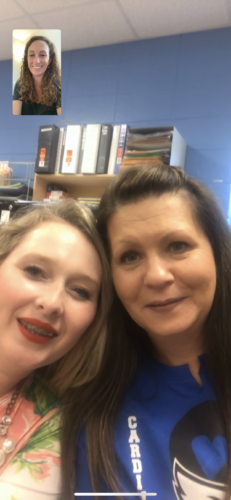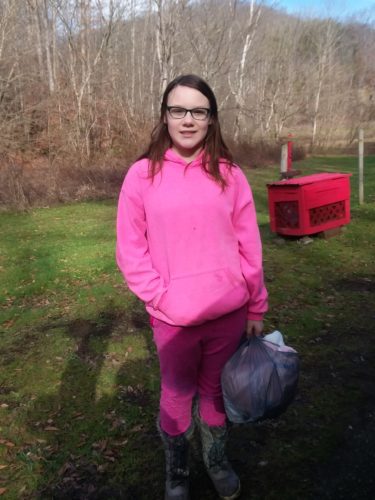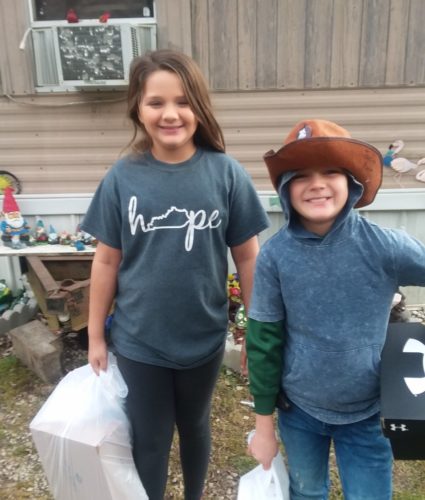Although in-person meetings with our volunteer coordinators were halted due to COVID-19, our amazing staff made sure they were still able to check in with our projects around the world to ensure children in our program continued to receive the care and support they needed.
Today, hear from U.S. Sponsorship Specialist, Shelley Oxenham, about her virtual meetings with coordinators in Kentucky and how your support has made an impact through the pandemic.
Although in-person meetings with our volunteer coordinators were halted due to COVID-19, our amazing staff made sure they were still able to check in with our projects around the world to ensure children in our program continued to receive the care and support they needed.
Louisa Elementary School
“I met with our volunteer coordinator, Jessica, who told me that the school closures and quarantine have been damaging to local small businesses and to employment numbers in Louisa County.
The majority of the jobs in the county are through the healthcare system or the school system. Many healthcare workers in the area have been furloughed since March because elective surgeries and procedures have been postponed for the time being. Recently there were five job openings at a regional medical center and over 160 applicants.
Most students at Louisa Elementary have internet connections in their homes. There are only about 5-8 families that do not. These students are given a new jump drive each week with their school work loaded onto it. A school staff member has trained the students and parents on how to use the jump drive.
Families who want to meet with the coordinator have to call and make an appointment to come up to the school. Jessica is also doing a lot of home visits to make sure the kids are doing OK with their school work and to make sure they have what they need like food, hygiene items, warm clothes, and whatever else may come up.”
Lawrence County High and Louisa Middle Schools
“I spoke with Anne and Luann who co-coordinate the two schools. They are staying positive that school will resume in-person soon and families will be able to choose as to send their children or keep them at home. So far approximately 60% of the middle school parents want their kids back in school and about 50% of the high school parents.

Shelley was able to host virtual meetings with our volunteer coordinators since in-person meeting were not an option during the pandemic.
Until then, Anne and Luann’s day-to-day routine looks different than it used to without the students roaming the halls. The have been helping prepare the daily food service for their schools. The bus drivers deliver food to the children’s homes each day, giving faculty touchpoints with the families, which is a very important contact with the outside world because some kids haven’t left their home since March.
They will soon begin to do home visits to students themselves. This will also be an important touchpoint to check on the welfare of the students and to evaluate their needs. Some of the families have been calling in with needs, and Anne and Luann are quick to help.
There are not many active COVID-19 cases in the county as far as Luann and Anne know. However, the response to the virus in the area has affected the local community. Many businesses have shortened their hours creating less work time for employees. Others have shut down and employees have been furloughed.
The local hospital had to file bankruptcy because they were unable to do surgeries for the first few months of the pandemic. As far the parents of Children Incorporated sponsored children, most were unemployed before the pandemic and they continue to be. This is why the program is so important for these families.
Luann and Anne have witnessed the mental and emotional aspect of the kids during the pandemic. They are seeing a lot more anxiety and depression. Even the kids who get out on family outings are struggling. Needless to say, those who are not getting out are really struggling. They hope that school will resume, at least to give it a chance and give the students a sense of normalcy.”
Fallsburg Elementary School
“I spoke with our coordinator, Brenda, about the students and families she serves and how they are coping with the pandemic.
She said her families have experienced a lot of food insecurity during the virus. They have a food bank in the community that serves about 225 people every couple of weeks. Many of the families they are serving are experiencing food insecurity for the first time. These are mostly families who have lost an income due to closures caused by the pandemic. Fortunately, the school has also started the weekly meal delivery to the homes. These meals are delivered to each and every student whether it is needed or not.
“The kids are adjusting to the changes at different levels; some ok and others not. A lot of families do not have the internet because it is not available where they live.”
Brenda’s biggest concern is the mental health and wellbeing of the students. There is a lot of neglect, abuse and/or drug activity in some of the homes. Often a big brother or big sister is in charge of caring for younger siblings throughout the day and night, putting a lot of pressure and stress on them every day of the week. The school is a safety net for these children during the school week. A second grade teacher said she is witnessing her students have anxiety from having to sit still in front of a screen for hours in a row — it’s been really tough on the kids.
Brenda is keeping in touch with her families and checking on their needs by doing porch visits and scheduling meetings with families in the school parking lot. She said phone calls are not an effective method to root out needs; it’s better to see them face to face. Brenda uses Children Incorporated funds to purchase items these families need.
The pandemic has majorly affected funding for the drug rehab facilities and housing units in the area. Prior to the pandemic, residents of the group homes were given paid job training and leadership opportunities. When the budget was cut, these programs were no longer able to operate. Residents lost their incomes as well as their stability and many ended up back on drugs. This has been a very sad and unfortunate repercussion of the pandemic.”
Inez Elementary School

Thankfully, our coordinators are able to conduct home visits to bring our sponsored children supplies while they are out of school.
“I spoke via Facetime with our coordinator, Andrea, and asked her how COVID-19 is affecting her students and families. Andrea explained that the kids with parents who are involved in their school life and school work are doing OK. These parents are keeping their kids busy and on a schedule. Many have taken day trips or have planned activities. They make sure their kids are up in time for virtual learning and are doing their school work, and they are helping them with their schoolwork when necessary.
For other kids it is a huge step back. Many haven’t left home in months. There is no schedule; they’re staying up late and sleeping until mid-afternoon. Routines have been lost. Hygiene is a low priority. At school the teachers and staff could monitor hygiene and health. There has always been a problem with lice and hair care and this was monitored and treated at school. Now children are living with lice and their hair is matted. Food has become an issue; with children home 24/7 they are eating a lot and many families can’t afford this.
Without the busy, bustling school day, Andrea often doesn’t know how to start her day. She is ready to get into more of a routine. She is planning to do ten home visits a week, if possible, to check on her families and their needs. Many families contact her when there is a need but many do not. During each visit she plans to distribute a hygiene package.
Eden Elementary School
“I spoke with our coordinators, Marlena and Barb, via Facetime. I asked them how things were going for their students and families.
“Children Incorporated funds were very important once school closed down in mid-March. The meal buses were not taking food to the homes at that time and the supplemental income from the government had not begun so the coordinators used the money to buy food and cleaning supplies for the families.”
They told me that families in the area were handling shutdowns well and making adjustments. They said that up until the end of August the families who were living on unemployment and food stamps were actually doing OK because of the supplemental funding from the government. This funding has recently ended, and they expect these families will begin to contact the resource center for help with things like food and other basic necessities.
The kids are adjusting to the changes at different levels; some OK and others not. A lot of families do not have the internet because it is not available where they live. The school is putting lessons on flash drives which can be uploaded onto a Chromebook. The buses deliver the lessons each week. The buses also take food to the homes which is a great way to keep students and parents on a schedule and a great welfare check.
Children Incorporated funds were very important once school closed down in mid-March. The meal buses were not taking food to the homes at that time and the supplemental income from the government had not begun so the coordinators used the money to buy food and cleaning supplies for the families. Over the summer the gardening project funded by Children Incorporated was so important to the families because it gave them something to do, something to learn and provided supplemental fruits and vegetables for their pantries.”
Martin County High School

Thanks to our sponsors, kids have been provided for through school closures since last March.
“I had a Facetime meeting with Kara Beth at Martin County High School. She had just started the Youth Service Center position at the high school the day before. I asked her how her families are doing and she said most families are just rolling with it like everyone else. Kara Beth said this is a small-town community with not a lot going on anyway so the difference between now and a year ago is small other than the fact that kids can’t go to school.
She said they all feared that the families were going hungry or struggling in other ways but they were surprised it was better than they thought. If anything, the school work is the biggest struggle for these families and their children. The work is getting harder as the days go on and kids are having a hard time staying on top of it and remaining self-motivated.”
Warfield Elementary School
“I spoke with Amanda who told me that Martin County schools will begin hybrid learning; families have a choice between in-school learning or virtual learning.
Most families at Warfield have chosen to send their kids to school, especially after experiencing the small dose of virtual learning they’ve had since the start of the school year. Amanda is looking forward to when the kids return; she said the empty school building is just weird and lonely. She misses kids coming in and out of her office all day wanting to talk or needing something. Once the students return, if the school grows in COVID-19 cases, they will go back to all virtual learning. As of now, the cases in the area remain low but are projected to grow.
Amanda said most of the students have handled all of the changes OK. The kids are antsy but they’ve been rolling with it. School lessons aren’t live; the kids can do their assignments any time of day and the teachers are available during school hours for assisting students. This helps parents who work during the day to help their kids in the evenings with school work.
The impact of the virus on jobs has been felt across the community. There is a modular tiny-home/cabin factory in Inez which is adjacent to Warfield (same county) and they have furloughed all 180 employees. A lot of families drive to Pritchard, West Virginia to work at a parts factory — this is an hour drive each way.
Amanda plans to continue with her routine of shopping herself for our sponsored children instead of asking families to meet her at Walmart. She calls the parents to see what the kids need and then she goes to Walmart and shop for them and then delivers the items herself.”
***
HOW DO I SPONSOR A CHILD?
You can sponsor a child with Children Incorporated in one of three ways: call our office at 1-800-538-5381 and speak with one of our staff members; email us at sponsorship@children-inc.org; or go online to our sponsorship portal, create an account, and search for a child that is available for sponsorship.

